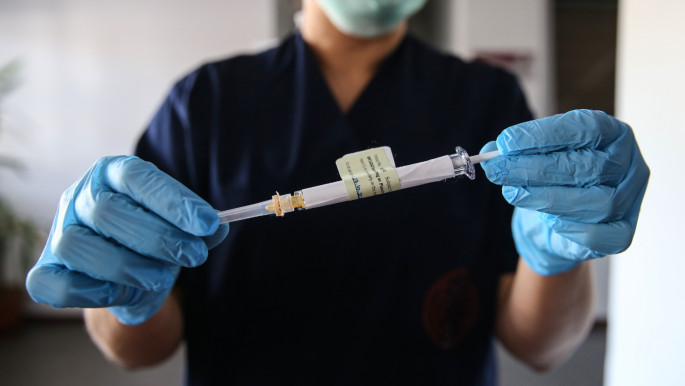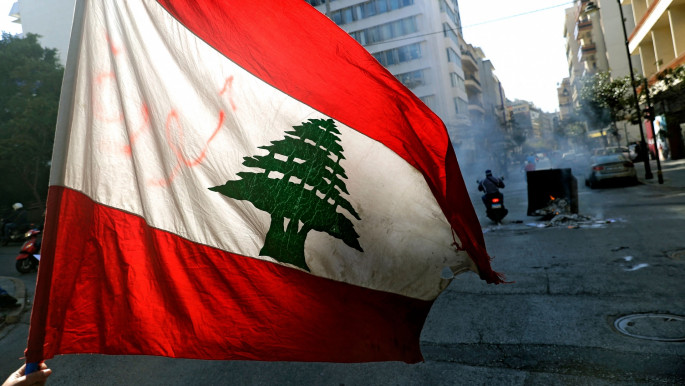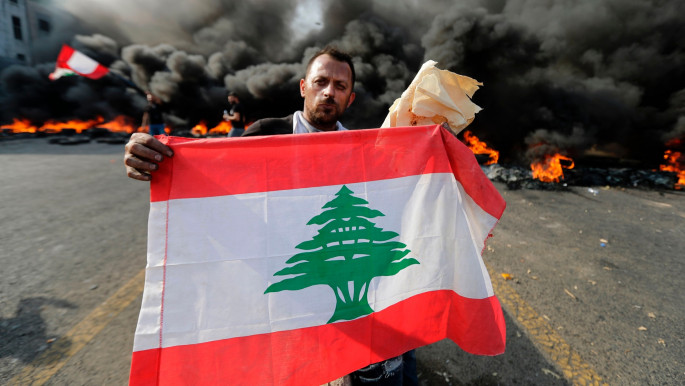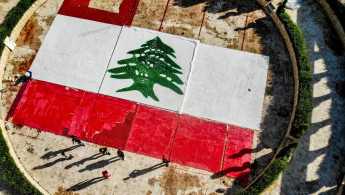In Lebanon, even vaccine distribution can't escape political bribery
Through an agreement with the pharmaceutical company Pharmaline, one million doses of the Russian vaccine, Sputnik V, were brought to Lebanon on 26 March, marking the country's first vaccine import by a private company.
"The private import initiative was welcomed as a means of expediting things," Dr. Abdul Rahman Bizri, head of the committee supervising the Lebanese vaccine campaign, told The New Arab.
Several politicians announced that they are trying to buy the vaccines privately to get their communities vaccinated. While most might appreciate this effort, many suspect that the timing is political, especially after the October 2019 protest movement, where many citizens demanded the "downfall" of the political class which ruled the country for more than three decades, with "all of them means all of them" being the revolution's rallying cry.
Member of Parliament Antoine Habchi announced that he is working with the private sector to obtain Covid-19 vaccines for his constituents and invited those aged 55 to 74 to register at his offices. Residents of Bcharre, where the Lebanese Forces (LF), a Christian political party, have a centre of interest, are also being registered by the Cedar's Mountain Foundation, which MP Sethrida Geagea of the LF leads.
 |
They appear to be betting that a successful vaccination effort can persuade voters to forget about their corruption and the economic damage caused by them |  |
With the elections approaching in 2022, some Lebanese politicians seem to be placing the vaccination drive at the centre of their re-election campaign by launching an aggressive media blitz portraying themselves as almost singlehandedly leading their communities or villages out of the pandemic.
"Up to this point, 700 people have received the vaccine at Antoine El-Khoury Maleka Touq-Bcharre Governmental Hospital, and they are continuing the campaign until the vaccination of all 2,300 people who applied," Geagea tweeted.
 |
|
| Read more: The geopolitics of vaccine diplomacy in the Middle East |
Fouad Makhzoumi, a Beirut MP and founder of the National Dialogue Party, announced that his organisation, the "Makhzoumi Foundation," would purchase 100,000 vaccines. The foundation has denied accusations of politicising the country's vaccination program, claiming that the vaccine will be given to anyone who needs it, not just residents of Makhzoumi's electoral district.
"They appear to be betting that a successful vaccination effort can persuade voters to forget about their corruption and the economic damage caused by them," said Bachir, who was approached by a politician to take the vaccine in exchange for his "loyalty," but has refused it.
"The October 17 movement was sharp for attacking parliament, banks, politicians' homes, bringing out salient corruption patterns in the public education system, media freedoms, health, environment but mainly corruption that uses violence to silence and burn down," Carmen Geha, activist and associate professor of public administration at the American University of Beirut told The New Arab.
"People who have experienced the extreme corruption level of these politicians will not settle for vaccines given by them and will not fall for this manipulation," she added. "They may save your lives, but they will take your dignity".
 |
While the World Bank remains silent about the government's violation of its own national plan, these events chip away at the hope many had of a fair rollout prioritising those most vulnerable to severe illness and death due to Covid-19 |  |
In February, the hashtag #NoWasta trended on Lebanese social media after the World Bank agreed to monitor Lebanon's vaccine distribution to prevent favours or influence from being used to secure doses. Unfortunately, the vaccine rollout has been damaged by controversy, with the World Bank threatening to halt funding for Lebanon's pandemic recovery following allegations that government ministers skipped the line. It's been almost five weeks since the initial threat, but no action has been taken.
"Both my grandparents have yet to receive a vaccine appointment while young, healthy people who are not a priority group are being vaccinated with the help of political leaders. How is that fair or logical? Is this the #noWasta campaign they talked about?" Fatima Al Mahmoud, a Lebanese citizen, told The New Arab.
It is also unclear whether these political campaigns will resonate with the legions of voters who have lost their jobs and after the local currency depreciated in value by 90% against the dollar, leading to inflation and shortages of food products and medicines.
 |
|
| Read more: Vaccine corruption in Lebanon and the World Bank's dilemma |
Based on data retrieved from the Ministry of Public Health, Lebanon has administered 285,211 vaccine doses; 1.31% of the population is fully vaccinated, 2.34% of the population is partially vaccinated, and 15.33% are registered.
According to the Minister of Public Health Hamad Hassan, Lebanon received 50,000 doses of the Sinopharm vaccine last Tuesday, a donation through the Chinese embassy. Hassan indicated that 30,000 doses would be dedicated to the army and the rest for journalists and cameramen. An additional 750,000 doses of the Pfizer vaccine have been ordered for the private sector, and delivery is expected in June.
 |
Both my grandparents have yet to receive a vaccine appointment while young, healthy people who are not a priority group are being vaccinated with the help of political leaders. How is that fair or logical? |  |
Bizri told The New Arab that Lebanon is going through a crucial two months where the most significant problem will be if large quantities of vaccines do not arrive, but "hopefully we will be able to obtain them, and this will reduce the slow pace of the vaccination process due to the great scarcity of doses."
"The new Vaccine Executive Committee has come out and announced a clear and measurable vaccination targets. IMO, the committee deserves to be given the benefit of the doubt. On vaccination, I prefer to stay positive and hopeful," Firas Abiad, head of Lebanon's main coronavirus hospital, said in a tweet.
 |
|
| Read more: Lebanon's uphill corruption battle against an 'untouchable class' |
"The ministry of public health is mismanaging the distribution of the state-bought vaccine, and at the same time is refusing to allow the sale of the vaccine on an individual level," Majd Harb, a lawyer and political activist, told The New Arab. Harb suggested that the ministry should allow private sales to join the Covid-19 vaccination drive and widen the pool of people eligible to speed up Lebanon's herd immunity goal before the year's end.
"While the World Bank remains silent about the government's violation of its own national plan, these events chip away at the hope many had of a fair rollout prioritising those most vulnerable to severe illness and death due to Covid-19," Sara Chang, a public health expert, told The New Arab.
"My fear as a public health professional is that continued government missteps and people's increasing distrust of authorities will undermine the Covid-19 response and vaccine rollout. This would ultimately harm public health and risk recovery from the pandemic, as well as the other compounding crises facing the country."
As the total number of coronavirus cases hits 496,846 at the start of the week, Lebanon, one of the hardest-hit countries in the Middle East, may face an even more dire situation in the weeks and months ahead. Deaths in the country have continued to climb as the national death toll passed 6,661 on Sunday.
Tala Ramadan is a journalist and activist who focuses on scientific, social, humanitarian, and educational issues.
Follow her on Twitter: @TalaRamadan



